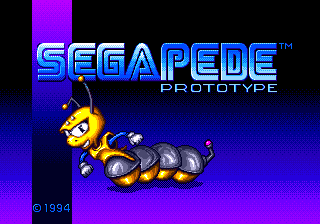Difference between revisions of "Astropede"
From Sega Retro
m |
m (Production credits sections are usually placed after History sections) |
||
| Line 14: | Line 14: | ||
}} | }} | ||
'''''{{PAGENAME}}''''', also known as '''''Segapede''''', is an unreleased [[Sega Mega Drive]] action game in development at [[Sega Technical Institute]] from September 1993 to mid 1994.{{ref|https://web.archive.org/web/20230601012129/https://hiddenpalace.org/Segapede_(Prototype)}} Conceptualized by STI artist [[Craig Stitt]], a working gameplay demo and several pieces of concept music were created for the project, but it was never announced publicly and ultimately never saw the light of day. | '''''{{PAGENAME}}''''', also known as '''''Segapede''''', is an unreleased [[Sega Mega Drive]] action game in development at [[Sega Technical Institute]] from September 1993 to mid 1994.{{ref|https://web.archive.org/web/20230601012129/https://hiddenpalace.org/Segapede_(Prototype)}} Conceptualized by STI artist [[Craig Stitt]], a working gameplay demo and several pieces of concept music were created for the project, but it was never announced publicly and ultimately never saw the light of day. | ||
| − | |||
| − | |||
| − | |||
| − | |||
| − | |||
| − | |||
| − | |||
| − | |||
| − | |||
| − | |||
==History== | ==History== | ||
| Line 40: | Line 30: | ||
Two years later on November 24, 2022, Stitt donated the demo's ROM to [https://hiddenpalace.org/Main_Page Hidden Palace] for public preservation.{{ref|https://web.archive.org/web/20230601012129/https://hiddenpalace.org/Segapede_(Prototype)}} Dated to 1994 and going by its earlier name ''Segapede'', it consists of only single level (the one which reuses [[sonic:Hidden Palace Zone|Hidden Palace Zone]] graphics) and features music from [[STI]]'s in-house composer [[Howard Drossin]].{{ref|https://web.archive.org/web/20230601012129/https://hiddenpalace.org/Segapede_(Prototype)}} | Two years later on November 24, 2022, Stitt donated the demo's ROM to [https://hiddenpalace.org/Main_Page Hidden Palace] for public preservation.{{ref|https://web.archive.org/web/20230601012129/https://hiddenpalace.org/Segapede_(Prototype)}} Dated to 1994 and going by its earlier name ''Segapede'', it consists of only single level (the one which reuses [[sonic:Hidden Palace Zone|Hidden Palace Zone]] graphics) and features music from [[STI]]'s in-house composer [[Howard Drossin]].{{ref|https://web.archive.org/web/20230601012129/https://hiddenpalace.org/Segapede_(Prototype)}} | ||
| + | |||
| + | ==Production credits== | ||
| + | {{creditstable| | ||
| + | *'''Lead Designer:''' [[Craig Stitt]] | ||
| + | *'''Lead Artist:''' [[Craig Stitt]] | ||
| + | *'''Enemy Designer:''' [[Alex Niño]] | ||
| + | *'''Programmer:''' [[Ken Rose]] | ||
| + | *'''Music & Sound:''' [[Howard Drossin]] | ||
| + | | console=MD | ||
| + | }} | ||
==Gallery== | ==Gallery== | ||
Revision as of 15:15, 1 October 2023
| Astropede |
|---|
| System(s): Sega Mega Drive |
| Developer: Sega Technical Institute |
| Development timeframe: 1993-09 to Mid 1994[1] |
| Planned release date(s): 1994 |
| Genre: Action |
| Number of players: 1 |
| State before cancellation: Partially-developed |
| Status of prototype(s): Prototype released[1] |
| Sound driver: GEMS |
Astropede, also known as Segapede, is an unreleased Sega Mega Drive action game in development at Sega Technical Institute from September 1993 to mid 1994.[1] Conceptualized by STI artist Craig Stitt, a working gameplay demo and several pieces of concept music were created for the project, but it was never announced publicly and ultimately never saw the light of day.
Contents
History
Development
Initially known as Segapede, the game was initially pitched to Sega of America as early as September 21, 1993 after development on Sonic the Hedgehog Spinball had concluded[2], with a playable prototype being produced by Craig Stitt and Ken Rose. During this phase, an early gameplay demo was created which reused the platform and background graphics from Sonic 2's Hidden Palace Zone; these were recycled by Stitt as a mean to save time during Segapede's production.

Craig's original intent was for the game to be part of the Sonic the Hedgehog universe, as ideas previously used in Sonic 2 were given a twist - the main character, Zipp, would be followed by a train of pods with various power-ups (such as a Turbo Charger, Scorpion Tail, and Pulse Cannon) that would be pulled behind him. If he was hit, the pods would scatter and start rolling away, similar to Sonic's Rings. The player would have also had to find a 'caboose' pod to secure the other pods so they wouldn't fall off when going too fast. A second player character, a hornet/wasp character named Sputnik whose abdomen could be swapped out with the same pods carried by the main character, was also conceived. Stitt recalls that Zipp's sprites and animations were created with a Digitizer System, with a 3D model of the character being created later in development.[3]
Zipp was first established to have been a creation of Dr. Robotnik that had become friends with Sonic, and would be fighting to save his creator's life by cleaning up and collecting “Chaos Dust”[2]. The ties to the Sonic universe would be dropped during development of the first playable build of the game as Sega wanted the project to be a standalone game, but the core gameplay concepts remained the same. The first playable build of the game with its revised story was pitched on November 22, 1993 - this version received positive reception from Sega, thus the project was greenlit for further development.
A starving lack of resources caused by STI trying to work on too many projects at once resulted in the game being cancelled after 14 months, alongside other projects, to prioritise other projects such as Comix Zone and The Ooze. After its cancellation, Craig Stitt was still hopeful that management might later approve the game for full development, and alongside changing its name to Astropede, included it in a video resume of his work created in 1995. Unfortunately, nothing further came of this, and the project was permanently shelved.
Legacy
On August 17, 2020, the game's artist, Craig Stitt announced he had located his 1995 video resume (assembled in preparation for leaving Sega Technical Institute). On this VHS tape was concept art from Astropede, alongside material from other unreleased titles like Treasure Tails and Dark Empires. Astropede's appearance here is of concept art and a 3D model only; while the game's titlecard appears in the resume's gameplay section, the actual video was excised. Instead, it was marked "Unable to show work at this time", due to Stitt's hope the game would eventually be approved for development before his departure from the company.[3]
Two years later on November 24, 2022, Stitt donated the demo's ROM to Hidden Palace for public preservation.[1] Dated to 1994 and going by its earlier name Segapede, it consists of only single level (the one which reuses Hidden Palace Zone graphics) and features music from STI's in-house composer Howard Drossin.[1]
Production credits
- Lead Designer: Craig Stitt
- Lead Artist: Craig Stitt
- Enemy Designer: Alex Niño
- Programmer: Ken Rose
- Music & Sound: Howard Drossin
Gallery
Technical information
ROM dump status
| System | Hash | Size | Build Date | Source | Comments | |||||||||
|---|---|---|---|---|---|---|---|---|---|---|---|---|---|---|
| ✔ |
|
453.6kB | 1994-06 | Page |
External links
- Sega Technical Institute’s Cancelled Segapede article at Hidden Palace
- Astropede / Segapede prototype footage
- Astropede short animation test




